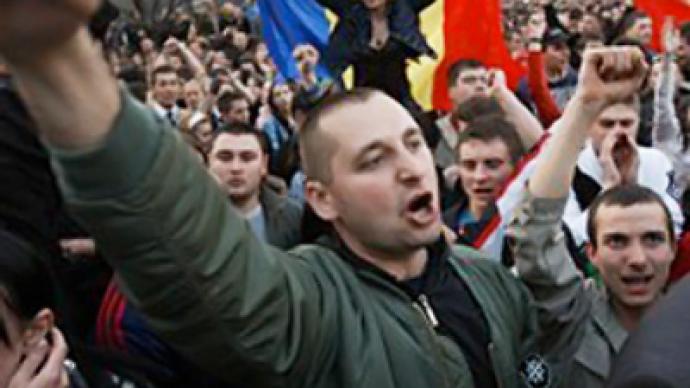Moldova dubs June 28 “Day of Soviet Occupation”

Moldova has declared June 28 the “Day of Soviet Occupation.” The country’s interim president, Mihai Ghimpu, signed the relevant decree on Thursday.
Talking to journalists, he said that memorial events will be held in the capital Chisinau and throughout the country on June 28, “the day of the 70th anniversary of the Soviet invasion of Moldova.” All entertainment activities will be cancelled and at 10 am the entire republic will plunge into silence for a minute, mourning the victims of the Communist regime.
In addition, a memorial stone will be erected on National Assembly Square, in front of the parliament building, where a Lenin monument used to stand.
“Later on, this will be the place of a monument to victims of the Communist regime,” Ghimpu, the republic’s acting president, was quoted as stating by the Interfax news agency. “June 28, 1940, was the beginning of our people’s tragedy – deportation, deliberate famine and de-nationalization. We must remember this."
He added that he signed the decree having closely studied the findings presented by a commission he directed last year to evaluate the “totalitarian Communist regime in Moldova.” He also considered the conclusions drawn by the Moldovan parliamentary commission on assessing the non-aggression treaty between Germany and the Soviet Union, also known as the Molotov–Ribbentrop Pact.
"There is no doubt that June 28, 1940, when Soviet forces entered Bessarabia, was a really black day in the history of Moldova,” Ghimpu said. “So, we will observe it as a miserable day of the beginning of Soviet occupation.”
On June 28, the commission will present its findings at a special parliamentary session.
The Moldovan leadership is also planning on banning Communist symbols and the Communist Party, which ruled the republic until recently and is currently an opposition party, Itar-Tass reports.
The Moldovan leader noted that prior to making the decision to sign the decree he didn’t hold any consultations with his colleagues from the ruling West-leaning coalition Alliance for European Integration. The faction members’ reaction has yet to be heard.
The move is sacrilege – Moscow
The Russian Foreign Ministry has deemed Ghimpu’s move to name June 28 the Day of Soviet Occupation “sacrilegious”.
It is “an element of a planned political campaign” aimed against the Russian-Moldovan partnership, the ministry said in a statement published Friday on its website.
According to the ministry, it is not the first time “pseudo-historic interpretations of causes and results of the Second World War– decorated as memorial dates – [have been] used as abasement for timeserving decisions made only in the interests of the ruling top and against national interests of the state.”
This yet another “attempt to rewrite our common history with the Moldovan people, and events connected to the Great Patriotic War of 1941-1945.” It is “sacrilege”.
Moscow says the motives behind the move are clear. It is aimed at “escalating emotions, distraction of public attention from the real problems of today’s Moldova and concurrently to break existing stability mechanisms on the Dniester River”.
The Foreign Ministry expressed hope that pragmatic approaches will prevail within Moldova’s ruling coalition and “the country will pursue policy aimed not at splitting, but at consolidating Moldovan society and at real and constructive development of Russian-Moldovan relations.”
Chisinau demands Russian troops’ withdrawal
Ghimpu’s decree also demands that Russia, as the successor to the Soviet Union, should immediately withdraw its troops from Moldova, where they are currently stationed on a peacekeeping mission.
Russia’s peacekeeping contingent – the Operative Group of Russian Troops (OGRV), previously known as the 14th Army – is stationed in Transnistria, the republic’s breakaway region. In addition to the peacekeeping mission, the roughly 1,500-men-strong OGRV also guards stores with weaponry which belonged to the Soviet Union and now is Russia’s property. Part of it has already been transported to Russia.
Shortly before the collapse of the Soviet Union, on September 2, 1990, five regions located mostly in a strip between the Dniester River and the eastern Moldovan border with Ukraine – concerned over statements by some radical groups in Chisinau calling for uniting Moldova with Romania – declared the creation of the Transnistrian Republic. The Moldovan leadership did not approve of the move and sent troops into the region, which resulted in a military conflict in March 1992 that lasted until July.
Currently the peace in the conflict region is maintained by Russian, Moldovan and Transnistrian peacekeeping contingents and by Ukrainian monitors.
Talks on settling the Transnistrian conflict should be resumed – Russian FM
Russian Foreign Minister Sergey Lavrov has said that Russia, Germany, France and Poland have called for resuming talks on settling the Transnistrian conflict, which were suspended in February 2006. The so-called “5+2” talks included Moldova and Transnistria as the main parties, Russia, Ukraine and the OSCE as mediators and the E.U. and the US as monitors.
However, Lavrov underlined that for the parties to return to negotiating table, the Transnistrian leadership need to have a clear idea of who exactly speaks for Chisinau, Itar-Tass reports. Meanwhile, contradicting statements coming from Moldova do not add to Tiraspol’s wish to go back to talks, Lavrov said.
The top Russian diplomat was discussing European security issues with his counterparts from Germany, France and Poland in the framework of the so-called “Weimar Triangle”. Summing up the results of the talks, Lavrov said Russia and the EU have agreed to join efforts to convince Chisinau and Tiraspol to resume talks.
“The main task is finding a mutually acceptable solution to the conflict within the framework of maintaining and strengthening Moldova’s sovereignty,” he said.
Natalia Makarova, RT












